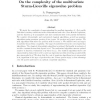Free Online Productivity Tools
i2Speak
i2Symbol
i2OCR
iTex2Img
iWeb2Print
iWeb2Shot
i2Type
iPdf2Split
iPdf2Merge
i2Bopomofo
i2Arabic
i2Style
i2Image
i2PDF
iLatex2Rtf
Sci2ools
117
click to vote
JC
2007
2007
On the complexity of the multivariate Sturm-Liouville eigenvalue problem
We study the complexity of approximating the smallest eigenvalue of −∆ + q with Dirichlet boundary conditions on the d-dimensional unit cube. Here ∆ is the Laplacian, and the function q is nonnegative and has continuous first order partial derivatives. We consider deterministic and randomized classical algorithms, as well as quantum algorithms using quantum queries of two types: bit queries and power queries. We seek algorithms that solve the problem with accuracy ε. We exhibit lower and upper bounds for the problem complexity. The upper bounds follow from the cost of particular algorithms. The classical deterministic algorithm is optimal. Optimality is understood modulo constant factors that depend on d. The randomized algorithm uses an optimal number of function evaluations of q when d ≤ 2. The classical algorithms have cost exponential in d since they need to solve an eigenvalue problem involving a matrix with size exponential in d. We show that the cost of quantum algori...
| Added | 15 Dec 2010 |
| Updated | 15 Dec 2010 |
| Type | Journal |
| Year | 2007 |
| Where | JC |
| Authors | A. Papageorgiou |
Comments (0)

